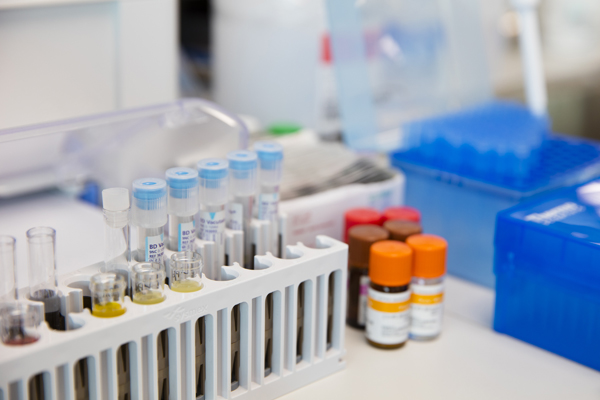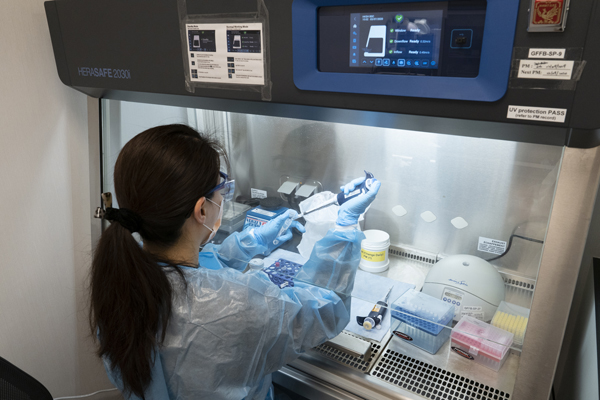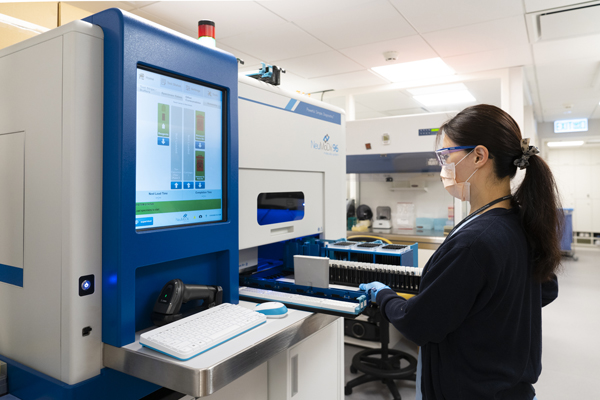Research and Knowledge Exchange on COVID-19
 Clinical Research
Clinical Research
Healthcare workers (HCWs) in Hong Kong were among the priority groups to receive coronavirus disease 2019 (COVID-19) vaccination. HCWs of Hong Kong Sanatorium and Hospital who enrolled for COVID-19 vaccination from 22 February to 30 April 2021 were recruited for serial measurement of their antibody response. Of the 457 HCWs recruited, none of them had prior COVID-19. 220 (48.1%) selected an inactivated vaccine (CoronaVac; Sinovac Life Sciences, Beijing, China) and 237 (51.9%) selected an mRNA vaccine (BNT162b2/Comirnaty; Fosun-BioNTech Pharma), based on their personal preference. At week 4, BNT162b2 resulted in a 11-fold higher level of anti-spike IgG (mean=11572.6 AU/mL vs 1005.2 AU/mL; P<0.001) and a higher surrogate neutralising antibody (sNAb) positive rate (100% vs 94.4%; P<0.001). At week 12, waning of IgG level was observed in both vaccine arms with a larger magnitude of decline in BNT162b2 (-72% vs -64.6%; P<0.001). Despite the more pronounced decline, the median anti-spike IgG of BNT162b2 remained 11-fold higher than that of CoronaVac at week 12 (2840.25 AU/mL vs 253.60 AU/mL; P<0.001). Significantly more CoronaVac recipients had lost their sNAb at week 12 (94.4% sNAb positive at week 2, 62.4% at week 12) whereas 99% of BNT162b2 recipients remained sNAb positive. Throughout the study period, BNT162b2 arm had higher levels of anti-spike IgG and sNAb (P<0.001). These results have demonstrated that both vaccines are immunogenic but BNT162b2 is associated with a superior humoral response. The results were published in two articles in Hong Kong Medical Journal.
Another study related to evaluation of a COVID-19 rapid antigen test was completed and published in Microbiology Spectrum Journal in 2021.
Published in World Allergy Organization Journal in December 2021, a study by Hong Kong Sanatorium & Hospital and LKS Faculty of Medicine, The University of Hong Kong (HKUMed) revealed that 98% of the allergic patients previously deemed to be at risk of COVID-19 vaccine-associated allergy were recommended for vaccination after allergist evaluation at Vaccine Allergy Safety (VAS) clinics between February and June 2021.The research team found that COVID-19 vaccination has been proven to be safe for patients who were previously deemed at higher risk of vaccine-associated allergic reactions. Unnecessary referrals for VAS screening would cause long waiting time for assessment and delays in vaccination. They also advised the concerned authorities the pressing need to reform the workflow of suspected COVID-19 vaccine-associated allergies including updating the current Hong Kong Institute of Allergy (HKIA) and Department of Health (DoH) guidance to remove non-COVID19 vaccine (or related excipient) associated anaphylaxis as a precaution for COVID-19 vaccination.
A study named "Research study on Immunogenicity of third dose of SARS-CoV-2 vaccine in non-responders and those with negative neutralizing antibody after standard 2-dose SARS-CoV-2 immunization" are now underway. Results are expected to be available in 2022.
























